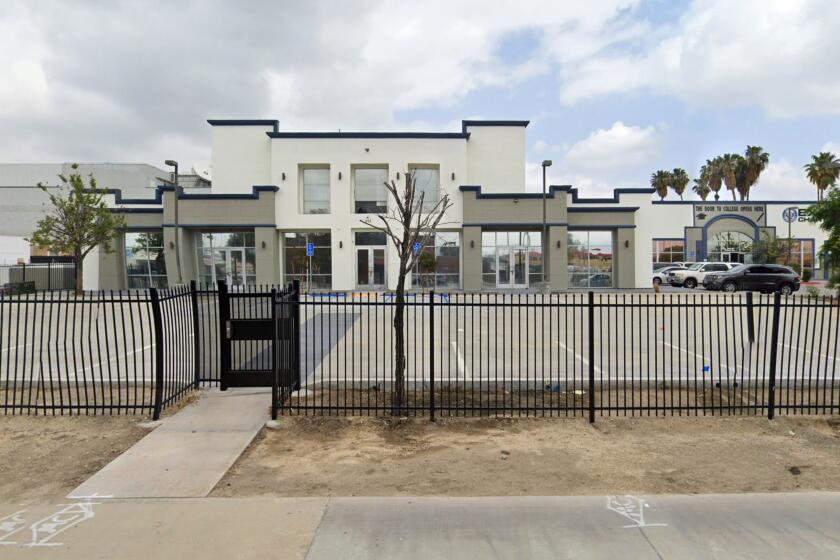Eureka’s future could hinge on dormant pulp mill
The timber industry has suffered a long decline in Eureka, an isolated community about five hours north of San Francisco.
Now, a group of entrepreneurs wants to restore a wood pulp mill there to its former glory. The hitch is they need someone to lend them $20 million.
FOR THE RECORD:
Pulp mill: An article in the Sept. 9 Business section about a wood pulp mill in Eureka said that current owner Bob Simpson bought the mill in 2009 after its former owners had abandoned it, leaving behind millions of dollars in debts. The article should have noted that the mill, once owned by Louisiana-Pacific Corp., had changed hands several times before it closed in 2008. Louisiana-Pacific did not own the mill when it closed. —
If they can’t get financing to reopen the facility, which closed two years ago, they say, the local port will fail, hurting surrounding lumber operations and the last remnants of a resource economy in this community of 25,000 people.
“The only thing that sets Eureka apart from Bakersfield or Grass Valley is this port, and without the mill, this port has a good chance of going insolvent,” said Sid Berg, president of the Humboldt and Del Norte Co. Building and Construction Trades Council, which supports the reopening.
In its heyday, the Louisiana-Pacific pulp mill, which converts scraps from timber operations into material for paper, generated so much pulp that two cargo ships pulled into the Eureka port each month. Those ships and two others serving another pulp mill in the region would transport the material to paper factories in Asia. Three additional barges brought in gasoline for the region’s filling stations.
Since the closure in 2008, a total of only three ships have entered the port. The harbor commission has been dipping into its financial reserves to keep the port running in the hope that the mill would reopen. If it doesn’t, the port won’t generate enough traffic to justify the expense of dredging the harbor or keeping bar pilots on staff to guide ships into the harbor, said David Hull, chief executive of the Humboldt Bay Harbor District.
If the port closes, gasoline would have to be trucked into the area over winding roads from San Francisco. That would put more trucks on the roads and raise transportation costs for the fuel, Hull said. The cost of Eureka’s water could also go up, because the pulp mill was contributing 15% of the district’s water revenue.
In addition, other lumber mills that traditionally sold their waste to the pulp mill — popularly known as the Samoa mill because of its proximity to the small town of that name — will have to burn it or truck it to Oregon to sell to other pulp mills.
Because of the increased expense, Schmidbauer Lumber Co. is making about half of what it did when the Samoa mill was still open, said general manager Richard Graham.
But opponents say it’s time to let go of manufacturing and stop pouring money into the towering smokestacks that have chugged since the 1960s. They say the Samoa mill’s backers are having difficulty raising capital because the deal simply doesn’t make business sense.
Bob Simpson bought the mill for $2.8 million in February 2009. Its former owners had abandoned it abruptly the year before, leaving behind millions of dollars in debts amid a deteriorating pulp market.
Simpson initially sought $400 million in financing to convert the property into a mill that would make eco-friendly toilet tissue. When that effort failed he lowered his sights to $20 million to restart the plant as a traditional pulp mill. Requests for loans, government grants and federal stimulus money so far have gone nowhere.
He’s now considering selling off the factory in pieces to recoup his investment. A Canadian company has offered to buy the mill’s boiler, and Simpson has to give them an answer by Wednesday.
Without timber, he said, the hardscrabble area won’t have much to sustain its economy. As fishing and logging have disappeared in the northern part of the state, many locals have taken advantage of the cool climate to venture into a more profitable business: cannabis.
“Humboldt County’s economy will be dependent upon the marijuana industry for its economic recovery,” he said. “I don’t believe that would be in the best interest of the state or federal government.”
Opponents say the mill polluted the environment and that the region would be better off focusing on tourism.
“It’s time to let go of it,” said Carol Binder, a West Eureka resident who can see the smokestacks of the mill from her home and runs a blog, People Against the Samoa Pulp Mill.
alana.semuels@latimes.com
More to Read
Start your day right
Sign up for Essential California for news, features and recommendations from the L.A. Times and beyond in your inbox six days a week.
You may occasionally receive promotional content from the Los Angeles Times.







